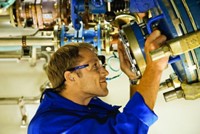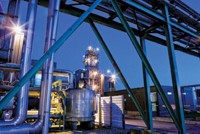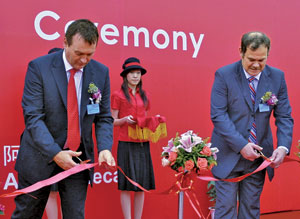Advertisement
Grab your lab coat. Let's get started
Welcome!
Welcome!
Create an account below to get 6 C&EN articles per month, receive newsletters and more - all free.
It seems this is your first time logging in online. Please enter the following information to continue.
As an ACS member you automatically get access to this site. All we need is few more details to create your reading experience.
Not you? Sign in with a different account.
Not you? Sign in with a different account.
ERROR 1
ERROR 1
ERROR 2
ERROR 2
ERROR 2
ERROR 2
ERROR 2
Password and Confirm password must match.
If you have an ACS member number, please enter it here so we can link this account to your membership. (optional)
ERROR 2
ACS values your privacy. By submitting your information, you are gaining access to C&EN and subscribing to our weekly newsletter. We use the information you provide to make your reading experience better, and we will never sell your data to third party members.
Business
Slow And Steady
Albemarle finds that a measured approach can win the race in custom manufacturing
by Lisa M. Jarvis
November 6, 2006
| A version of this story appeared in
Volume 84, Issue 45

While many Western players in the pharmaceutical fine chemicals industry have struggled in recent years just to keep their heads above water, Albemarle has managed to swim ahead. Since entering the business four years ago, Albemarle has quadrupled its custom manufacturing revenues. Now, its purchase of DSM's active pharmaceutical ingredients (API) plant in South Haven, Mich., points to more growth on the horizon.
Albemarle's relative success may be due to its metered approach to building its business in fine chemicals and custom manufacturing. Between 2000 and 2001, a number of companies rushed into the field through splashy acquisitions: Clariant laid out $1.8 billion for BTP, DSM bought Catalytica for $800 million, and Rhodia paid $545 million for ChiRex.
But that exuberance began to wane in 2002, when decreasing numbers of drug launches, industrywide overcapacity, and competition from Asian companies combined to precipitate an industrywide downturn. Many players were forced to restate the value of their new assets. Firms such as Clariant and Rhodia retreated from custom pharmaceutical chemical manufacturing altogether.
Albemarle, on the other hand, made a much more bite-sized purchase to get into custom manufacturing. Though the company had extensive API experience through its manufacture of the bulk analgesics ibuprofen and naproxen, the $74 million purchase of ChemFirst in 2001 was its first real push into custom manufacturing.
"It was a good asset for them," says James Bruno, director of the consulting firm Chemical & Pharmaceutical Solutions. ChemFirst was strong in pilot-scale and process development chemistry, he notes, and brought manufacturing capacity that was small enough to be quickly integrated into the Albemarle fold.
As the firm has expanded its custom manufacturing business, it has also taken a different approach to handling competition from Asia. Although pricing pressure has caused some players to abandon the market and driven others to make acquisitions in China or India, Albemarle has instead focused on fine-tuning its North American assets and moving into higher value services, says David Clary, the firm's vice president of fine chemistry services.
"A Western supplier can compete with Asian suppliers, but you have to be confident in your basic technology," Clary says. Albemarle's strategy is to move into a more service-oriented segment. Rather than just offering the basic chemistry for which it has been known, such as a one- or two-step bromination, the company is now focused on providing advanced APIs or intermediates that tap its technology strengths.
This strategy extends to its traditional analgesics business, where Albemarle has seen particularly tough competition from China. "Because of our technology and scale, we could compete on price, but our strategy is to focus on more value-added forms of ibuprofen," such as different salt forms, Clary notes.
Furthermore, Albemarle has worked to develop a "nice, tight network" of manufacturing assets in Dayton, Ohio; Tyrone, Pa.; and Orangeburg, S.C.; Clary says, each of which has its own particular skill set.
To those plants, the company is now adding the manufacturing capabilities of DSM's South Haven facility. The acquisition adds kilo-, pilot-, and commercial-scale capacity that conforms to current Good Manufacturing Practice (cGMP) standards, while also bringing into the mix some generic APIs made at the site.
About a year ago, Albemarle started converting its Orangeburg naproxen plant into a multipurpose facility intended to make more than just the analgesic. That investment was completed in January, and the plant, which primarily handles large-volume manufacturing, has been running at full capacity all year, Clary says.
The South Haven plant came along at the right time for Albemarle. "If we hadn't bought, we would have had to expand at Orangeburg, which would have meant stopping production there," Clary notes.
In keeping with its emphasis on service-oriented businesses, Albemarle recently sold its organobromides facility in Thann, France, to International Chemical Investors. The site made primarily non-cGMP pharmaceutical intermediates and agricultural chemicals.
Noting these changes, Bruno, the consultant, says he thinks Albemarle is "doing a better job at managing their assets and managing which projects they choose to bring in." He notes that while some companies are looking for "quick money" by taking on any project to fill their capacity, Albemarle appears to be looking for longer term, stable growth.
Successfully managing both assets and projects is an ongoing process, particularly in the rapidly changing environment of fine chemicals. "We have to continue to get better at each step," Clary says.
But for now, the slow and steady strategy appears to be paying off. The company snared a prime contract last spring when it was chosen as one of Roche's production partners for intermediates for the antiviral drug Tamiflu. "For the next year, the world is going to be great for four or five companies, and Albemarle is one of them," Bruno says.





Join the conversation
Contact the reporter
Submit a Letter to the Editor for publication
Engage with us on Twitter